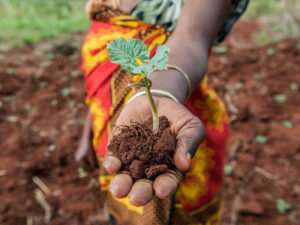Managing the Potential of Soil Carbon to Achieve Impact at Scale
 Healthy soils are vital for our environment. They hold benefits for food security and biodiversity, as well as mitigate greenhouse gas emissions and help to adapt to the adverse impacts of climate change. Increasing the rate of soil carbon can significantly reduce the CO2 concentration in the atmosphere related to human activity. Herewith, it is a crucial element to meet the targets of international agendas, like the Paris Agreement and the Sustainable Development Goals.
Healthy soils are vital for our environment. They hold benefits for food security and biodiversity, as well as mitigate greenhouse gas emissions and help to adapt to the adverse impacts of climate change. Increasing the rate of soil carbon can significantly reduce the CO2 concentration in the atmosphere related to human activity. Herewith, it is a crucial element to meet the targets of international agendas, like the Paris Agreement and the Sustainable Development Goals.
Even though the potential of soil carbon has been widely recognized, there is missing practical upscaling of soil carbon practices. The problem of permanence as well as putting quick wins over long-term achievements hinder the broad upscaling of successful sustainable land management action. Thus, it is important to discuss barriers and knowledge gaps to overcome, as well as innovations and transformations that should be used to raise its potential.
To do that, PlanAdapt collaborated with GIZ in 2020, to identify practical pathways across scales from policy and markets to the farm level to lever the global and regional potential of sustainable land management and soil carbon sequestration.
Barriers and solutions have been identified around different topics. One example is the potential of selling carbon credits from sustainable land management practice in Voluntary Carbon Markets, in line with the experiences of ViAgroforestry and their Kenya Agriculture Carbon Project (KACP). It has been discussed how to encounter the high financial costs through co-financing or how to increase institutional capacities by identifying community champions. Another area is the creation of governance structures which enable agriculture, soil and environment actors to work together. To initiate a holistic transformation and link adaptation with mitigation measures it is important to create coherence in the implementation of soil and climate action as well as create synergies between the different agendas.
Thus, action is needed on multiple fronts. To foster the practical solutions at scale, PlanAdapt supported the preparation and implementation of exchange formats like webinars and the co-creation of synthesis papers to encourage exchange between experts from international think tanks, research institutes and practice. The synthesis paper ‘Enabling Coherence for Sustainable Land Management and Climate Policy‘, as one of the project outputs, reflects on the linkages between sustainable land management and climate change and provides guidance on a holistic approach to land use and climate policy processes within the scope of international agendas and national actions.
